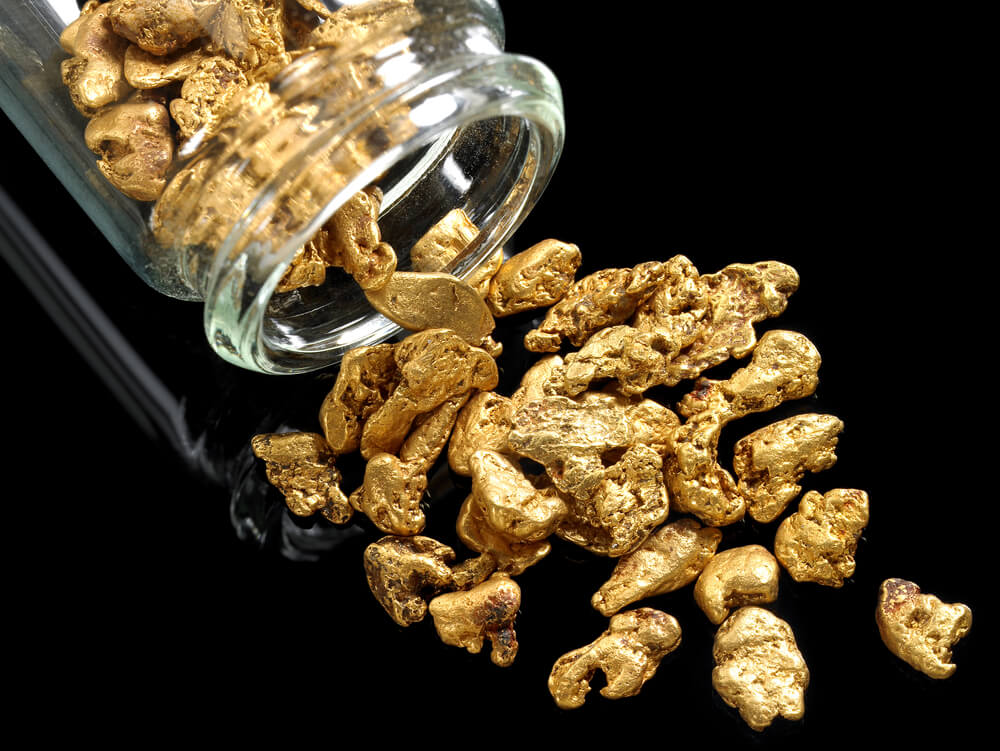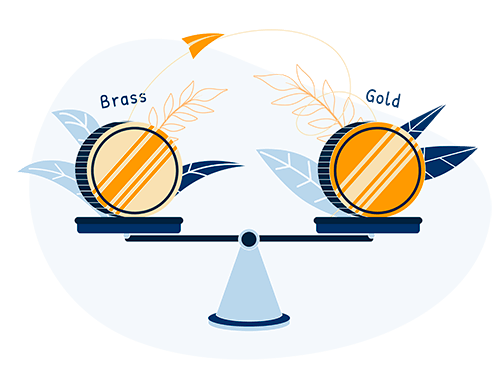
Is a Gold IRA for Seniors Smart for Your Retirement?
Although the awareness about retirement savings has increased in the past few years, many people still don’t put real thought into securing their financial lives during their non-working years in advance. Retirement is a big milestone for any individual, and being prepared for it should be a part of the planning for the future. The last thing you would want is to look for employment again during your retired years to meet your healthcare costs, routine expenses, etc.
A good retirement plan must promise a comfortable lifestyle and financial stability. And to achieve that, it’s critical to consider the available varied investment choices. The goal should be to grow the retirement funds and do that relatively risk-free. Though the stock market promises faster growth, it also increases the likelihood of you depleting your investments. Investing in gold is a lot more risk-averse. But then, the precious metal has storage requirements. What about a gold IRA?

A gold IRA is an excellent alternative to buying gold in the metal. There are several advantages to it. But there are a few drawbacks too. This article intends to throw light on all of those aspects. We shall discuss the following:
- What is a gold IRA
- How to buy gold under the retirement account
- How to store the gold and withdraw
- Pros and cons of gold IRA investments
- Being a proactive senior investor in gold IRAs and more
If you’ve been on the fence about gold IRA investing and are ready to bite the bullet now but think it’s too late, think again. Learn why you can still incorporate a gold IRA into your retirement planning strategy.
Table of Contents
Gold IRAs: A Brief Intro
Also called a “precious metals IRA,” a gold IRA (individual retirement account) is a self-directed IRA that holds gold and other precious metals. Other prized assets or investments, such as real estate and art, are also allowed within a gold IRA. Gold-related paper assets such as ETFs (exchange-traded funds), gold stocks (shares of gold mining companies), gold mutual funds, etc., are permissible too. The physical gold or the other assets’ value determines the gold IRA’s value.
The physical gold permissible in the IRA must meet specific fineness and minting requirements set forth by the IRS (Internal Revenue Service). The IRS rules relating to IRA gold are:
- The gold bullion bars and coins must be 99.5% pure, at least. Other precious metals’ purity requirements may differ slightly.
- As mentioned in the previous point, the gold added must be a bar or coin. Even if the article meets the purity requirements, it cannot be any other type, such as jewelry.
- The gold bullion must be made at an IRS-approved mint. Also, gold coins shouldn’t be rare or collectible coins, as their values cannot be easily quantified.
The above help ensure investors buy high-quality precious metals, which hold value over a period. Gold IRAs have capped annual contributions, meaning only a certain amount of gold or other valuable items can be bought under the specialized retirement account (more about that later). A gold IRA has multiple stakeholders: a custodian/IRA company, precious metals dealer, a depository, and you (the IRA owner). Because a gold IRA entails buying and storing physical gold, it carries higher fees than traditional IRAs. Gold IRA is a massive topic. Click here to learn more about the IRA account, its setup, custodian and storage fees, etc.
Read more: How is Gold Taxed in IRA
Gold IRA Funding and Withdrawals
You can create a gold IRA from scratch and add money or roll over funds from a current retirement investments account, such as a 401(k) or traditional IRA, to the gold IRA. Let your current retirement account provider know you want the funds rolled over to the new account. Alternatively, withdraw money from your existing retirement savings account—transfer the funds to your bank account and then direct them toward your gold IRA account.
Taxes and/or penalties may apply based on the chosen funding method. You can invest pretax or after-tax dollars (traditional or Roth IRA). Talk to your financial advisor about the funding options and their tax implications. It is usually a trustee-to-trustee transfer or a direct rollover with zero potential penalties or tax consequences. Once the method or route of funding is chosen and the transfer starts, the funds will arrive in your individual retirement account with the fresh account custodian. You may then use the money to invest in approved precious metals such as physical gold and silver.
A gold IRA has “yearly contribution limits.” Those vary based on your marital status. Talk to your IRA custodian to learn more. You can add gold or other precious assets worth not more than $6,000 annually if you’re under 50 years old. If you’ve crossed the threshold, your per-year contribution can go up to $7,000. Contributions above the maximum limits will attract a 6% penalty. Not to mention, there are no income requirements to start a gold IRA. You should be good as long as you meet the minimum investment requirement of the gold IRA account.
Like a traditional IRA, distributions begin when you’re 59.5 years old. Withdrawing before that shall incur a 10% penalty. You may postpone withdrawals, or it’s not mandatory to take money out when you turn 59.5 years old. You can let your investments sit and grow in value. But once you turn 72, the IRS mandates “required minimum distributions.”
Why is a Gold IRA a Smart Retirement Portfolio for Seniors?

A gold IRA has no age barrier or requirement. You can set up an account as early as 18. You can also start later. If it’s a traditional gold IRA account, you must be 70.5 years old or less to make contributions. A gold Roth IRA has no age limits.
Starting a gold IRA later in life has its advantages. As mentioned above, you can contribute up to $1,000 more if you’re 50 or older. Also, you can let the funds remain in the account until you become 72 years old. Another age-related benefit is that no taxes apply on the withdrawals made when you’re 59.5 years or older.
Arguably, the most important thing for seniors saving for retirement is preserving wealth. No other investment vehicle or asset safeguards your funds like a gold IRA. Stocks, municipal bonds, and mutual funds are more concentrated on growth or are risky, which older investors may not have the appetite for.
Gold’s limited supply and intrinsic value are a store of wealth for the long term, protecting against currency devaluation and market volatility. Seniors are usually more sensitive to market fluctuations and find comfort in adding physical gold to their individual retirement accounts. They’ll take less uncertain gold investment earnings over subjecting their wealth to increased stock market risks.
Gold IRA Investing Benefits
In addition to the above, here are a few other benefits of investing in gold IRAs.
- Portfolio diversification: By adding gold to your portfolio, you diversify your investments. Because gold has a low correlation with stocks, bonds, and other traditional investments or financial assets, gold will stabilize your portfolio when the other investments decline in value or experience volatility.
- Inflation hedge: When there’s inflation or paper money’s value drops, gold maintains its buying power. Gold prices rise parallelly with the cost of consumer goods and services and usually surpass the prices of goods. Check the rate of inflation and the price of gold during any period. Gold prices would have overtaken consumer goods prices multiple times. Long story short, gold safeguards an investor’s purchasing power and prevents inflation-induced wealth erosion.
- Intrinsic value: Gold is inherently valuable. And when there’s economic turbulence, geopolitical uncertainties, or market downturns, gold demand increases, driving the price of gold and further boosting the precious metal’s “good investment” image. Gold’s positive performance during the 2008 sub-prime mortgage crisis and the coronavirus pandemic are a few real-world examples. Gold value surpassed $2,000 per ounce in 2020. The price was around $1,500 in the year’s beginning.
- Capital growth: Gold IRAs don’t offer interest income like mutual funds or returns like dividend-paying stocks but have long-term appreciation potential. Gold’s scarcity, limited supply, and global demand contribute to its worth, enhancing overall portfolio performance.
Gold IRA Drawbacks
No investment type is foolproof, and it will be disingenuous to not highlight some of the disadvantages of a self-directed gold IRA.
- Fees: A gold IRA is costlier to maintain than traditional IRAs. Gold storage fees and custodian fees are unique to gold IRAs and can vary based on the gold type, quantity, and IRA custodian you deal with. Not to mention, gold IRA custodians could charge administrative or account management fees. These costs could decrease your overall returns and hurt your investment’s cost-effectiveness.
- Limited growth: Although gold appreciates over time, its growth potential is relatively small. The absence of dividends or interest earnings is a major differentiating factor. Market sentiment and demand dynamics determine gold’s value. Gold investments do not provide the income generation and growth potential real estate, stocks, etc., may offer.
- Liquidity: Gold holdings can be challenging to convert into cash. Selling the physical gold held is usually time-consuming and entails added transaction costs. There’s the market factor too. If the economic conditions and market sentiment are not primed for selling gold, selling gold quickly could be more challenging. And although you can sell your gold IRA back to your custodian, the buyback quote will be less than what the market offers. Not to mention, accessing gold IRA for quick cash requirements won’t be that instantaneous.
- Volatility: Although gold investments are much more stable than other financial assets, gold can be exposed to considerable price fluctuations or market volatility. The economic turbulence, however, is temporary and not significant. But when it happens, it will negatively impact the worth of your gold IRA.
Note that the above limitations have not decreased the popularity of a precious metal IRA. The interest among investors, particularly seniors, has been continually rising, reflecting the desire to invest in gold investments and protect wealth against financial market uncertainties.
Read more: Home Storage IRA
Be a Proactive Gold IRA Investor
If you’re investing in gold for the first time, it’s imperative not to get duped by fake or impure gold or a nefarious gold IRA service provider. Although associating with a gold IRA firm affords a sense of assurance, you still shouldn’t take the backseat and rely entirely on their expertise. Thoroughly research the company before committing to investing. Check its reputation, background, industry experience, licenses, registration, etc. Read testimonials, reviews, and ratings from reliable sources.
Be more proactive when choosing the precious metals dealer you buy gold from, the quality of gold, and more. There have been instances of counterfeit gold bars and coins in circulation. Although most gold IRA companies work to serve your interests, some may need to be more deliberate and not prioritize their interests over your financial situation and requirements. Therefore, partner with established dealers and confirm that the gold procured meets industry standards or that you purchase precious metals approved for inclusion in a self-directed IRA.
Also, although your gold IRA custodian takes care of IRS regulations and local and state guidelines concerning your precious metals IRA, knowing what those are is advisable. Education is vital to making any investment decision, and the move to invest in gold is no exception. Seek professional advice if self-educating doesn’t help entirely. There’s no dearth of financial advisors with years of experience in precious metal investments and retirement planning.
Setting up the account properly is not job complete. Regularly review your gold IRA and investment portfolio to ensure it stays aligned with your shifting financial objectives, risk tolerance, and market scenarios. Keep up with the financial market trends and regulatory changes, if any. Rebalancing and adjusting your gold IRA investments is essential for proper asset allocation. Staying informed will help you do that efficiently.
Conclusion
With humans living longer than ever, retirement planning has never been as pertinent as now. Thanks to healthcare advancements and people’s desire to live longer, retirement years could easily span multiple decades. And to sustain during those years, proper financial planning beforehand is critical. If your retirement portfolio is sorted or you have enough retirement savings, you will not have to depend on family members’ support or social security benefits. You achieve financial autonomy in the truest sense.
Although there are different ways to invest for retirement, a gold IRA is a relatively risk-free and reliable way to save for your non-working years. However, diversity is still key, or do not let your retirement portfolio be entirely or predominantly gold IRAs. Although gold is a safe asset to park funds in, it won’t necessarily accelerate your portfolio’s growth. It’s, therefore, recommended to diversify and remain invested in other stocks and bonds, traditional retirement accounts, real estate, mutual funds, etc.
As always, talk to an expert before making any personal finance decision. Consult with your financial advisor to ascertain the proportions or how much to invest in which asset. Also, associate with the right gold IRA companies and watch out for scams. As a senior citizen, you may not be as financially savvy or easily trust or fall prey to some sketchy gold IRA schemes.
FAQs
Should seniors invest in silver as part of their retirement plan?
Senior investors can put their money in silver coins, bars, and other physical precious metals under a gold IRA account. Both gold and silver are intrinsically valuable and renowned for their ability to appreciate over the years. Silver averaged around $5 per troy ounce in 2000. In January 2023, silver was valued at approximately $24. As mentioned earlier, silver and other valuable metals are subject to the exact stringent requirements of gold.
Silver is a cheaper alternative to gold, and its market dynamics are not identical to the yellow metal, thanks to silver’s predominantly industrial applications. That is why silver is more volatile compared to gold. The fluctuations could present both risks and opportunities for investors. Also, custodial and storage costs will vary, usually cheaper than gold. Long story short, understanding the silver market’s dynamics and the potential impact on your investments is vital.
Can I store gold bought under a precious metals IRA at home?
You cannot purchase gold bars and coins under a gold IRA and keep them at home. The IRS mandates IRA-eligible gold to be stored with an IRS-approved depository. A gold IRA’s storage requisites cannot be altered even if you have a safety deposit box at home. If you want to buy gold and keep it at home, do it outside a gold IRA account. Not to mention, the risks attached and the taxes you’ll attract by storing gold in your place.
Are a gold IRA company and custodian the same?
No, a gold IRA firm and an IRA custodian aren’t the same. Although several gold IRA companies offer custodian services, there’s a clear distinction between the two. A gold IRA firm helps set up and administer a self-directed IRA. They help their clients acquire precious metals and educate them on investing in gold through an IRA. They could also assist with selecting a custodian and navigating the fund transfer process or moving retirement funds from another account.
A custodian is an entity that keeps and protects IRA funds or assets. The custodian stores the gold or other physical precious metals on the account holder’s behalf in an IRS-approved storage facility or depository. They are responsible for securing and properly administering the gold held in the IRA. Custodians could also take up administrative duties relating to the account, like reporting to the IRS and complying with their regulations.
Gold IRA firms and custodians usually work in close quarters. Because the nature of work is quite similar, gold IRA companies often take over the custodian’s job or serve as both an IRA company and custodian. And that is why the confusion arises. Choosing a qualified custodian and a reputed gold IRA firm is essential to ensure a compliant and smooth gold IRA experience.


